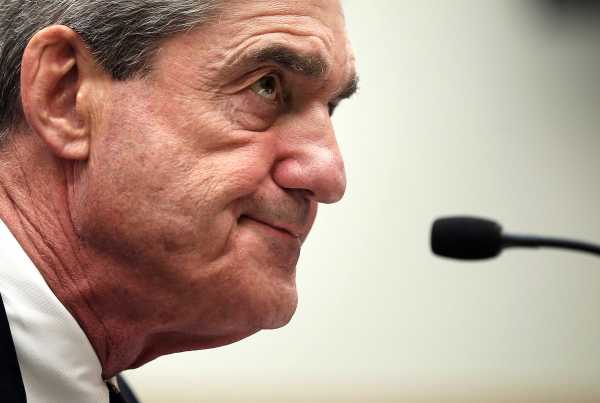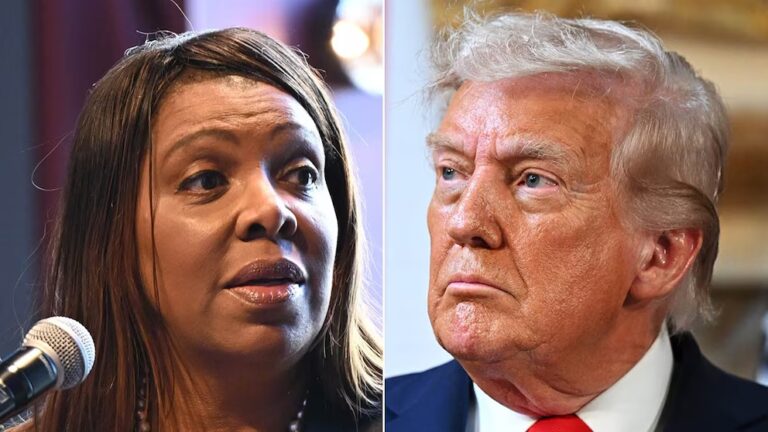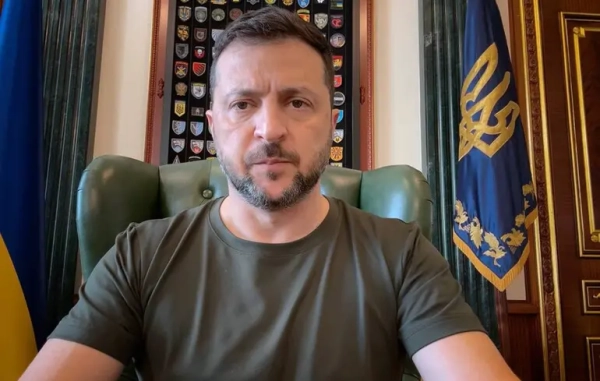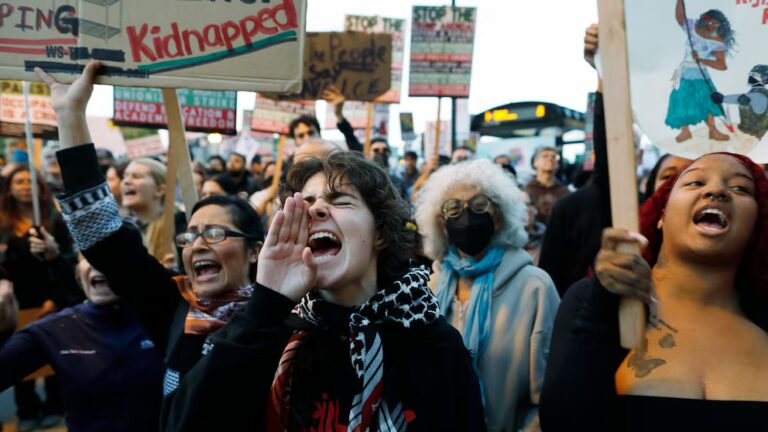
President Donald Trump’s tweets furiously criticizing special counsel Robert Mueller this weekend have initiated a new round of discussion about whether the president will finally fire Mueller, in an effort to halt the Russia investigation.
Trump took on Mueller by name for the first time on Twitter this Saturday, writing that “the Mueller probe should never have been started,” that it was not “fair” that “the Mueller team” had several Democratic prosecutors, and adding Monday that the investigation was “a total WITCH HUNT with massive conflicts of interest!” (Those first tweets came the day after Trump’s Justice Department fired Deputy FBI Director Andrew McCabe.)
Meanwhile, Trump’s personal lawyer John Dowd went a step further, telling the Daily Beast this weekend that the Justice Department should now “bring an end to” the “alleged Russia Collusion investigation” (though a later statement from White House lawyer Ty Cobb then tried to claim Trump “is not considering or discussing the firing of the Special Counsel”).
Now, all this could well be a PR strategy aimed at discrediting Mueller’s investigation rather than laying the groundwork for firing him. But liberals fear that a recent trend of Trump defying advisers who counsel caution will finally lead to him pulling the trigger — and that he’ll get away with it, since a sycophantic Republican Congress would likely take little action in response.
Yet it’s worth keeping in mind that even though Trump has wanted Mueller gone and his investigation shut down for at least nine months — by one account, Trump actually tried to push Mueller out last June — he’s been either unwilling or unable to actually make it happen so far. And it’s worth understanding the several reasons why that is.
The process of getting rid of Mueller is much more complicated and legally fraught than, say, firing FBI Director James Comey or Secretary of State Rex Tillerson. Furthermore, dismissing Mueller himself wouldn’t end Mueller’s investigation — an even more controversial intervention would be required for that. Then, even if he pulled it off, Mueller’s firing would likely lead to a flood of leaks. Finally, the ensuing backlash could help Democrats regain control of Congress — which could make Trump’s legal and political situation even worse.
It is certainly possible that Trump could change his mind and decide that, despite all this, Mueller’s probe is so dangerous that it’s worth casting caution to the wind and firing him. But he’s been afraid to take that step so far — and for some very good reasons.
1) Firing Mueller would be much more procedurally complicated and legally challenging than firing Comey or Tillerson
Last week, President Trump fired Secretary of State Rex Tillerson with a tweet. Last May, he fired FBI Director James Comey with a signed letter. Both men served at the president’s pleasure — all the president had to do was say the word, and they were gone.
Things aren’t so simple with Mueller. The special counsel was appointed under a Justice Department regulation that sets restrictions on just how and why he can be fired.
The how, in this case, is by Deputy Attorney General Rod Rosenstein (since his boss Jeff Sessions recused himself). Rosenstein appointed Mueller, and according to the regulation, he’s the only person who can fire him.
Then there’s the why, which is also very important here. The regulation states that a special counsel can’t be fired on a whim. Instead, it says, he or she can only be fired for “misconduct, dereliction of duty, incapacity, conflict of interest, or for other good cause.”
If Trump truly was hell-bent on dumping Mueller, these problems probably wouldn’t be insurmountable. But the solutions aren’t pretty — they all involve either more firings or some questionable legal claims.
Regarding the why, the regulation does say a special counsel can be fired for “conflict of interest” — which may explain some of Trump’s recent tweets:
Publicly and privately, Trump and his allies have floated several alleged conflicts that they think could be used to justify ousting Mueller — ranging from Mueller’s past working relationship with Comey to a years-old Mueller request for a dues refund from Trump National Golf Club. Legal experts don’t seem particularly convinced by these, and Trump’s own White House counsel Don McGahn reportedly refused to order Mueller’s firing based on these pretexts last year. But a hackish enough Trump Justice appointee could cite them as an excuse for the firing.
The trickier question is the how, considering Rosenstein has repeatedly said he sees no good cause for firing Mueller and has testified that he wouldn’t carry out an order to do so unless he saw good cause.
There are several ways Trump could get around this, though.
- Trump could fire Rosenstein and whoever replaces Rosenstein in the Justice Department’s line of succession until he finds someone willing to dismiss Mueller.
- Another path would be through firing Attorney General Jeff Sessions. Theoretically, a new attorney general would not be recused from overseeing the Russia investigation like Sessions was, and would replace Rosenstein as Mueller’s boss. However, a permanent attorney general appointee would need to be confirmed by the narrowly divided Senate.
- Trump could also evade both the Justice Department’s line of succession and Senate confirmation by exploiting a little-known law called the Federal Vacancies Reform Act. With it, he could appoint a temporary replacement for Sessions or Rosenstein who’s already been confirmed by the Senate for some other post elsewhere in the government. (Environmental Protection Agency Administrator Scott Pruitt has been rumored as one possibility.) Whoever this stooge is could then dump Mueller.
- Trump could also rescind the regulation establishing the special counsel’s office altogether — but revoking a regulation is a lengthy and complex process.
- Finally, he could make a broad executive power claim that he has the power to fire Mueller on his own. But that could lead to a showdown with his own Justice Department (Rosenstein has testified he believes only he can fire Mueller), and would likely end up in court.
Again — if Trump wants Mueller gone enough, he can probably make it happen. The point is that getting there would be far uglier and look far more corrupt than even the firing of Comey.
2) Firing Mueller does not mean ending the Mueller investigation
All of that lengthy preceding section was just about the complexities of firing Robert S. Mueller III, the person.
It doesn’t even begin to address another problem Trump would have to solve — that is, how to end Mueller’s investigation.
Currently, 17 prosecutors are working under Mueller in the special counsel’s office. They’re working with many FBI agents. They’ve convened at least two grand juries (in Washington, DC, and Alexandria, Virginia). They have live indictments against Paul Manafort (in two jurisdictions) and against 13 Russian nationals and three Russian companies. Mueller’s team has also banked guilty pleas from five people who have not yet been sentenced. There could even be sealed indictments we don’t know about (George Papadopoulos’s indictment was sealed for months).
Firing Mueller would not make all this vanish. For that, a more proactive cover-up would be necessary. Trump’s hypothetical stooge at the Justice Department would have to not just be willing to dismiss Mueller, but to affirmatively act to shut down (or at least, rein in) his investigation.
Again, this is something that Trump probably could make happen should he be willing to bear the political consequences. For instance, he could have his Justice Department stooge appoint a crony as a replacement special counsel for Mueller, who will make sure the investigation progresses no further. But it’s yet another step up in difficulty and controversy from just firing one person.
It’s also worth remembering that President Richard Nixon failed at this stage of the cover-up process. He fired his top Justice Department officials until he found one who’d get rid of the special prosecutor investigating Watergate. But then that Justice official (Robert Bork) appointed a new special prosecutor, Leon Jaworski, who ended up investigating the case vigorously.
3) Firing Mueller would unleash the leaks
In 10 months of subpoenas, evidence collection, reviews of intelligence intercepts, and witness testimonies, Mueller’s team has gathered an enormous amount of information on the Trump campaign, business, transition, and White House. (For instance, he obtained the full transition team email accounts of 13 Trump aides.)
We don’t know how much of what they have relates to potential criminality, or how much might just be politically damaging were it to become public. But it sure seems likely that, should Trump make a corrupt-looking attempt to shut down Mueller’s investigation, lots of this information would find its way to congressional Democrats or to the media.
Recall what happened when Trump fired Comey back in May — over the ensuing weeks, a remarkable series of bombshell leaks occurred. They were about events both old (Trump’s inappropriate request for Comey’s “loyalty” at a private meeting, his later request that Comey end the investigation into Michael Flynn, and Jared Kushner’s seeking a back channel to communicate with Russia during the transition) and new (Trump’s revelation of classified intelligence to Russian officials in an Oval Office meeting).
Mueller’s probe has been remarkably leak-proof so far. Should the probe be shut down in what looks like a corrupt manner, it seems unlikely that would continue to be the case. At least some law enforcement officials would likely prove more willing to take the legal risks for leaking, should they feel it’s the only way to prevent a cover-up. And of course, the leaks after Comey’s firing were eventually followed by Mueller’s appointment.
4) A Trump cover-up could improve Democrats’ chances of retaking Congress — which would worsen the president’s legal woes
It’s well understood that Trump would face a political backlash for firing Mueller. In and of itself, that probably wouldn’t be enough to hold him back from doing it — after all, he’s been willing and even eager to make controversial political moves in the past.
But the real risk for Trump is in what that political backlash could make likely — a Democratic takeover of one or both chambers of Congress in 2018.
Already, the national environment is worrying for Republicans. The president is unpopular. Democrats lead by 9 points in FiveThirtyEight’s average of congressional generic ballot polls. And Democrats have been consistently bettering their 2016 performance in special elections. The enormous controversy that would result from a shutdown of the Mueller investigation could supercharge all this.
The problem for Trump is not that he’d be sentimental about the GOP’s electoral fate. It’s that Democratic control of even one chamber would unleash empowered opposition party–controlled investigations into him and his administration on Russia, obstruction, and a host of other issues.
That is to say, firing Mueller could help Democrats retake Congress, and end up landing Trump in far more investigative hot water and political jeopardy.
Trump could well calculate that despite all this, Mueller’s investigation is dangerous enough to himself, his family, or his allies in the near term that it’s worth taking the enormous risk of shutting it down.
But anyone who thinks firing Mueller would make Trump’s legal problems go away is badly mistaken. Instead, it would be the beginning of a new and far more serious crisis — with no end in sight.
Sign up for Vox Sentences
Subscribe
By signing up, you agree to our Privacy Policy and European users agree to the data transfer policy.
For more newsletters, check out our newsletters page.
Sourse: vox.com






